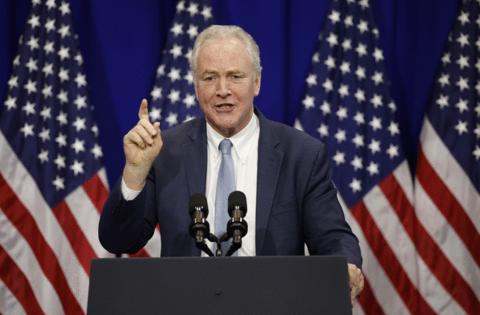Chesapeake Bay-area lawmakers call for action on imports of Venezuelan crabmeat
Published in News & Features
BALTIMORE — Maryland and Virginia lawmakers have sent a letter to President Joe Biden calling for his administration to address an “influx of crabmeat from Venezuela, which has threatened the viability of local fisheries across the Chesapeake Bay.”
The officials, including Maryland Sens. Chris Van Hollen and Ben Cardin, as well as several Maryland representatives, called on Biden to direct the U.S. International Trade Commission to investigate any harm caused by the imports and recommend remedies, and “use the full array of informal activities available” to address the problem, including “negotiations, utilization of World Trade Organization Committees, bilateral dialogues, and other activities.”
A 2022 U.S. Department of Agriculture report found that Venezuelan blue crab accounted for 35.8% of the value of that country’s agricultural exports to the United States in 2021. In 2016, Venezuela’s crab exports totaled 1,674 metric tons, and were worth $23.3 million. The market since increased fairly steadily, reaching 2,726 metric tons and $62.42 million in 2021.
The South American nation has 14 crab processing facilities, mostly located in the state of Zulia, along the coast of Lake Maracaibo, according to the USDA study. The industry’s primary crabmeat products are backfin (jumbo lump), lump, special, claw and cocktail fingers.
The lawmakers’ letter also pointed to concerns about Venezuelan crab being mislabeled or contaminated. In 2018, crabmeat originating from Venezuela caused an outbreak of vibrio infections, resulting in multiple hospitalizations, according to the letter. At the time, the Maryland Department of Health warned residents to avoid consuming crabmeat labeled as Venezuelan.
Since the 2018 incident, the supply of imported crabmeat has increased, “creating the conditions for a 62% decrease in the domestic supply.” The increase is harming the crabbing industry in the Chesapeake Bay, which produces about 50% of the total U.S. harvest for blue crabs, according to the letter.
Aubrey Vincent, owner of Lindy’s Seafood on the Eastern Shore, which specializes in processing Maryland crabs, said the demand for her product practically seems to run on Venezuela’s schedule.
When Venezuela implements conservation measures for blue crab, temporarily diminishing exports, the demand for domestic crabmeat increases, Vincent said. But once the measures conclude, the demand drops off, she said. That’s largely because the Venezuelan meat is generally priced very low compared to locally produced meat, she said.
“There’s no way we can compete. We’re paying fair wages. We’re following health standards,” Vincent said. “We do still have customers that really care about where their food is coming from. But that’s not everybody.”
The boom-and-bust cycle makes it more difficult for processors like hers, one of about a dozen remaining in the Chesapeake region, to make consistent purchases from the crabbers they rely on, Vincent said. It’s unlikely that Maryland crabmeat could satiate all the demand for blue crabs in the region, and the foreign imports may fill a void, she said.
“But some of the voids that Venezuela is filling, I don’t know if they need to keep filling,” Vincent said.
Vincent, who also serves on the board of the Chesapeake Seafood Industries Association, was grateful to see the lawmakers’ letter and hopes it means further action comes from the federal government.
Future government actions could include some sort of tariff on foreign crabmeat, she said, or clear labeling that informs customers about where the crabmeat in the grocery aisle and at seafood restaurants comes from.
“Where your food comes from is one of the most important things that you can think about,” Vincent said. “Not just from a nostalgia standpoint, but from a health standpoint.”
_____
©2024 Baltimore Sun. Visit baltimoresun.com. Distributed by Tribune Content Agency, LLC.







Comments